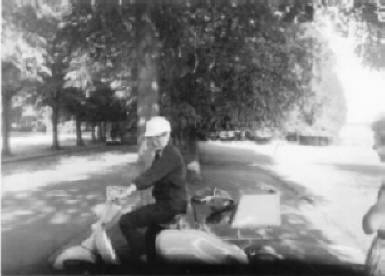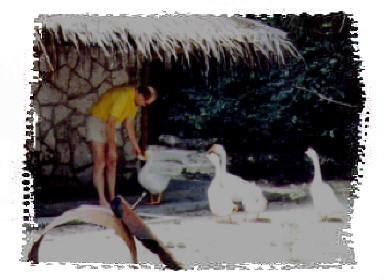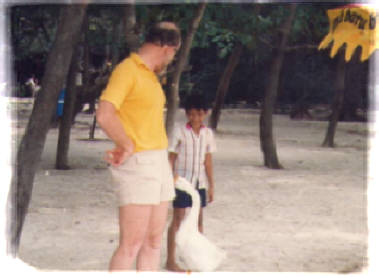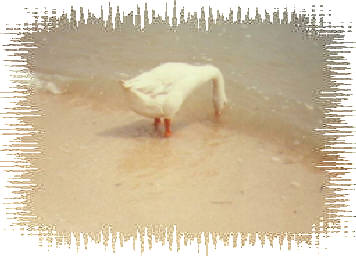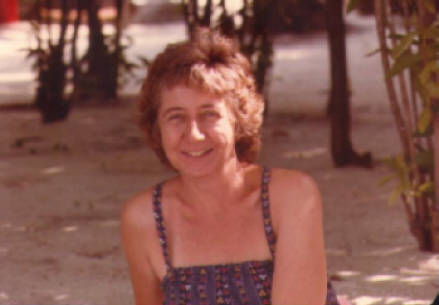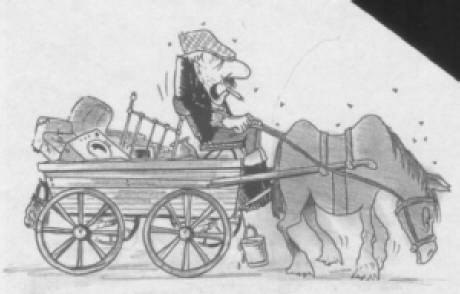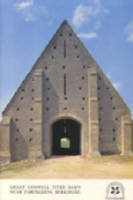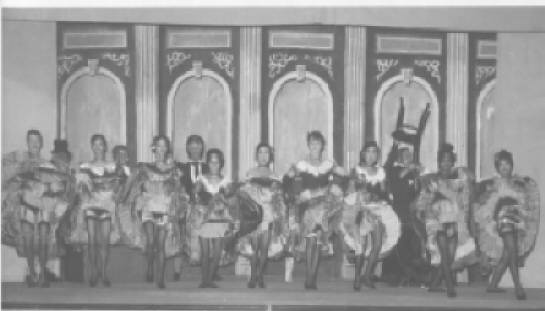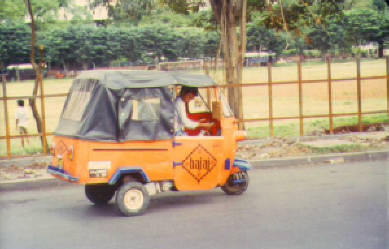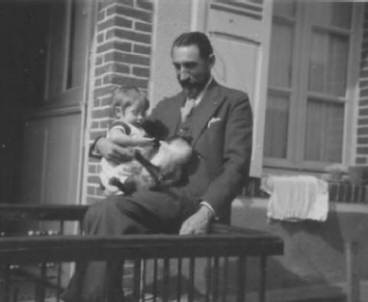Christ's Hospital 1957
Martin
The first time I took Martin home to meet my parents, they knew very little about him, except that we had met at a dance in Swindon Town Hall, that he was a lieutenant in the British Army and studying for a degree in engineering at the Royal Military College of Science.
Martin arrived, not on a white charger, but on an old B.S.A. motorbike. Enveloped in bulky grey overalls and a khaki flying helmet which he must have found in the RA.F. museum, I privately hoped he'd disrobe before my parents saw him. First impressions, I felt, were important.
Introductions were made. Initial contact was painful, as Martin believes in a firm handshake. Bone cruncher would be a better description. My father winced, recovered and smiled bravely.
We went into the lounge for what turned out to be an unsubtle third degree from my parents who, concerned for my future welfare, wanted to know all about Martin's background.
The more they probed, the more their body language registered polite disbelief. It all sounded too colourful to be credible. I could see my mother surreptitiously counting on her fingers, trying to relate what appeared to be fantasy, to facts.
Despite our Anglo French background, Martin's family history was infinitely more exotic and really true, as my mother later admitted.
His Anglo Irish mother born in Hongkong, educated in Australia, France and England - his father, born in Mexico of English parents, educated in England and at that time, general superintendent of the precious metal extraction mill in Pachuca, Mexico.
As first cousins, Walter and Margaret met and married in Mexico ("In breeding?" I could see my mother thinking). Martin too was born in Mexico and his secondary schooling was in Jamaica.
By then, my parents had a lot to think about and as the meal was ready, we moved into the dining room.
Martin, thinking to please, brought out a precious tin of exceedingly hot chillies, sent by his parents from Mexico. He persuaded us to try them, assuming we would enjoy them as much as he did. Obligingly, we accepted his generous offer, but not having been brought up to cope with such fiery fare, we hastily sought relief in copious glasses of water. "The trick" said Martin, "is to take a big pinch of salt off the back of your hand."
Years later, I wondered why one had to take salt off the back of the hand, as an antidote to chillies, then realised that it was a more refined way than taking it from the palm. Manners maketh man in Mexico!
The Indomitable Snow Lady
Shrivenham, Wiltshire. 1958
My Lambretta was ideal as summer transport to and from school, but when black ice sleeked the roads and snow drifted deeply, travelling could be exciting, stressful or even downright lunacy.
One winter afternoon, I was returning to the bed-sitter which was our first home, when the temperature dropped, freezing the packed, rutted snow on the steep hill between Penhill and Shrivenham.
Bumping and skidding along, I thought I still had a reasonable chance of getting home before dark. Suddenly, I lost control and Lambretta and I slid inexorably into the deepest ditch and snowdrift around.
Shocked, I checked that I was alright. I was unhurt, but the scooter was too heavy to move out of the ditch. What to do? I could leave the Lambretta and walk home, but it was several miles away.
Then, creeping cautiously over the brow of the hill, I saw a familiar vehicle coming towards me. Martin's trusty ex butcher's van to my rescue. Throwing all pride aside I scrambled up onto the road and flagged Martin down. He was relieved to find me unhurt, although resembling a snowman.
Somehow, he lifted the Lambretta into the back of the van and we made our way home.
Steam Powered Food
Shrivenham 1958
Our landlady suffered from inability to taste or smell food. That explained the awful messes I'd find her concocting in the kitchen. As Mrs Roper said. "Everything is tasteless, so what's the point of going to great lengths to produce a culinary masterpiece?" I saw her point, but at least she could have made an effort to please her eye, if not her palate.
One day I went into our shared kitchen, and found Mrs Roper's pressure cooker making highly agitated sounds. The pressure valve rattled and hissed as the steam exited ever more forcefully. With an exultant WHOOSH the pressure cooker literally blew its top. Steam accelerated soup hit the ceiling. The combined sight and smell was appalling. Scorched soup splattered everywhere!
"Oh well", said Mrs Roper peering myopically through misted glasses, "at least there's enough left for my supper." ,
Traditional Army Curry
Being an officer's wife brought new challenges. The most memorable was the ordeal by fire .My introduction to the wives club, to which I looked forward with mixed feelings, remains seared in my memory. This was in 1958 during my first experience of the RMCS at Shrivenham. After the usual introductions, chit chat and drinks, came the greatest gastronomic ordeal I have ever experienced. It was curry, proudly made by the committee. I gathered that the mark of a good curry was the heat, not as in temperature, but spiciness.
Having been brought up to enjoy lightly seasoned food, without garlic and very little onion, I wasn't able to cope with the pungent mess triumphantly served to me, decorated with slices of raw onion. One tentative taste and I knew I had failed my first test as an officer's wife.
It puzzled me that people should choose to eat such foul food.
Then one day years later in 1965, we were invited to a meal with Harry Kataria, a charming Indian who was on the same course as Martin at the Military College of Science. On arrival, we were asked whether we liked curry. Martin eagerly replied that he enjoyed Indian food, and the spicier, the better. I timidly asked whether I could have a milder version, as , even so many years later I still had memories of my first ordeal with Army curry.
Harry too, had been surprised by the British Army's idea of a good curry. As he said, curry means gravy. It comes with different seasonings and needn't be hot at all. He promised me that after I had sampled his wife's cooking, I would then know how delicious a traditional curry dish can be. He was right. We've had many Indian meals since then; some delicious, many very ordinary and the one we had at the REME workshop at Ulu Pandang Johore Bahru, was sublime. So many subtleties in the flavour; definitely a curry to savour.
What a pity that Helen and Jane were too young to apprecia te it, although that was the firs t time that they had Gula malacca, a. sweet made of tapioca, coconut milk and palm sugar. A deliciously refreshing way to end a. spicy meal.
Garden Cottage,
Poland Lane, Odiham. 1959
The gas fire hissed and popped, heating our faces, whilst the draught whistled under the door and behind our cold backs.
Our feet were warm, resting on a thick sheepskin mat. Thankfully, we shared a rare moment of peace, with six month old Helen finally asleep.
Out of the corner of my eye, I saw something move. It was a field mouse, creeping under the door, scuttling across the damp brick floor and curling quietly at our feet into the cosy depths of the sheepskin.
So soundly did it sleep, that it didn't stir when we eventually left the room to brave the arctic chill of the upstairs bedroom.
Next morning, the mouse was still there, dead. Martin and I were touched that it should have shared it's last hours so trustingly with us.
Army Posting to Singapore
Flight into the Night
1960
On a dank, dismal February day, six months pregnant, I waited with Martin, ten month old Helen and several other army families at
Stansted Airport near London. Our 5 p.m. flight to Singapore was delayed for technical reasons but we were assured that the problem would soon be fixed. It wasn't.
At hourly intervals, an impersonal voice informed us over the public address system, that our flight would be delayed for yet another hour.
By 10 p.m., adults were tired and children fractious. Tension mounted when we were told that our flight would not take off until the following morning. The airport staff apparently expected us to sit patiently through the night. This was the last straw.
After some pressure from Martin, we were reluctantly given permission to use a staff dormitory. There were just enough single beds to go round
- one for each family. I was fortunate in only having to share my narrow bed with Helen. Jane, three months away from being born, decided to settle down too. What a relief it was to stretch out for a few hours, particularly with the thought of a twenty four hour flight ahead of us.
The men were not so fortunate, they spent the night in the waiting room on hard wooden chairs.
Morning eventually came, and with it, our second meal of kidneys on toast, courtesy of Stansted airport. The plane was now deemed fit to fly. We boarded with mixed feelings, sadness at leaving England and excitement mixed with uncertainty as to what lay ahead.
The flight was long, uneventful and tedious, and memorable only because we had our third meal in twenty four hours which tumed out to be
- kidneys on toast!
We stopped briefly in Istanbul, Karachi, and Calcutta but were not allowed to leave the plane. The suffocating humidity and overwhelming stench of third world cities made me wonder how I was going to cope with living in Asia.
At last we reached Singapore. After lumbering through the air for 24 hours, a flight which would take 13 hours nowadays, we were only too relieved to get off the plane and stretch our cramped bodies.
There was no sign of the army transport which was to meet us. We stood waiting, at what was then a very basic airport, wondering whether we had been forgotten. Eventually an open jeep bounded along the road towards us, pulled up sharply, and out jumped an embarrassed young lieutenant. He and the driver were new to Singapore and had lost their way. With assurances that they knew the route to the officers' hostel in Bras Basar Road, we took off into the tropical night .
A Long Drive in the Tropical Night
Singapore 1960
What an experience - our senses assaulted by the sights, sounds, smells and feel of all that went to make up the Singapore of the early sixties.
No air-conditioned transport, no sanitised streets and soaring skyscrapers, no anonymous blocks of flats - just the smell of smouldering charcoal at the open air food stalls, the aroma of unfamiliar spices, the cloying stench of aphrodisiac durian and choking, eye-watering effluvia from open drains.
Then there was the sound of Chinese, Indian and Malay music blaring out from the shophouses. The click of mahjong pieces, the clack of itinerant foodsellers' coconut shells advertising their wares.
Unbearable heat and humidity, the persistent mosquitoes relishing the fresh vital blood of orang puteh. To add to it all, the sheer exhaustion of bouncing along rough roads in a jeep when pregnant.
We had been travelling for over half an hour when the driver confessed that he wasn't sure that we were on the right road. After a tense conversation between Martin, the driver and the lieutenant and much tracing of our probable route on a map, we resumed our journey and eventually arrived at the Army hostel in Bras Basar Road.
We were greeted by a dour Scotswoman who informed us that we were too late for the evening meal. I burst into tears and we were shown to our room. The manageress thawed slightly and grudgingly said that we could have any leftovers from the evening meal. This turned out to be cold roast potatoes, mutton, grey green beans and congealed, greasy gravy. Not at all appetising, but at least it filled a need.
The next morning Martin bought a map and retraced our route from the airport to the centre of Singapore and discovered that we had been driven round the perimeter of Singapore, instead of cutting straight across to the centre. No wonder it had taken so long.
Attempted Immolation
Kuala Lumpur 1962
I'd heard of the practice of female suttee in India, but male suttee in Malaya was new to me, until the night when, lying on our kapok stuffed mattress, trying not to toss and turn in the oppressive heat and humidity, I dozed off.
I awoke sometime later to an unusual sight and smell. With the bedding smouldering, Martin lay totally relaxed, oblivious to his impending immolation.
Fascinated, I watched as the ceiling fan whipped firefly sparks into the air.
Still dazed from a deep, if unrefreshing sleep, it slowly occurred to me that I should be doing more than enjoying the scene. Yes, I should wake Martin up. Not as easy as it sounds. When Martin is asleep, he is dead to the world - not on the verge of wakefulness.
Persistent poking, prodding, shaking and calling his name eventually roused him. Blearily Martin surfaced, asking testily why I'd woken him up..
Pointing to the smouldering mattress, I acidly commented that perhaps he would rather I'd left him until he was done to a turn?
Securing his scorched sarong around his waist, he stripped the bed, damped down the smouldering kapok and discovered.the cause.
Particularly persistent mosquitoes had ignored the burning mosquito coil's pungent smoke and were helping themselves to Martin's iron-rich blood. Half asleep, he had put the coil by his side on the bed. Of course it had fallen over and had set light to the kapok mattress.....
We still have the scorched sarong as a souvenir.
A Breath Taking Flight
Singapore to Sarawak 1963
Kneeling neatly in the gangway of the airborn~ Vickers Viscount, was our co-pilot. Was this a subtle way to let his passengers know that there was a serious problem? But not to worry, he was praying for us.
Had he lost his contact lens and put the plane on auto pilot, whilst he checked the wildly patterned carpet for his missing meniscus?
Was this perhaps. normal procedure on Malaysian Air Lines? Was he about to lead the predominantly Muslim passengers, in bowing to Mecca. Surely this was not a publicity stunt to get more followers of his particular faith?
Even more fevered fantasies flitted through my mind. Then the captain tensed, concentrated his gaze, his questing fingers found a gap in the carpet. Peeling it back.he exposed a metal plate with a hole in the centre.
By now, all the passengers were aware of this unscheduled flight entertainment. Some looked bored, some bemused and many apprehensive.
Out of the pilot's back pocket came an angled handle. It was inserted into the metal plate and wound clockwise. slowly at first then with increasing speed until it finally locked. The handle was removed and with an air of relief the pilot returned to the cockpit and closed the door.
As we settled down again, redirecting our attention to the broccoli-like tree tops, five thousand feet below, a disembodied voice was heard over the drone of the engine. reassuring us that now that the landing wheels were down, we could look forward to landing safely in Kuching - Thank you captain, dear captain.
Jumble Sale in Faringdon Jungle
1965
I wondered why Edith Stevens, the headmistress of Faringdon Infants School ,looked amused when I said I'd be delighted to help with the Jumble sale. I soon found out. The following weekend Edith and her helpers met at the local Corn Exchange. There was a tense atmosphere as we put the
accumulated jumble out on trestle tables, before our customers came in. Then came wise warnings from experienced Jumble Sale ladies.
Hide your handbag. Hide your coat.
Keep your eyes peeled. Beware the Bl----s. Beware the Love-----s.
Both families had representatives in my class of six year olds
. I now understood the reason for the warnings. We were there to make a profit, not as a charitable organisation. Clothing the Bl....s and the Love....s for free, was not on our agenda.
Two o'clock. For the past quarter of an hour, we heard our clientele growing increasingly impatient as they gathered outside the hall door. Fortunately doors were sturdily made in the eighteenth century. This one would last at least another century, despite the treatment it was being subjected to by some of Faringdon's less disciplined citizens.
Time to start. With a wry look at her helpers, Edith turned the key, retreating to safety behind the door as our eager customers swarmed in. Momentarily, I panicked. This was not like the orderly arrival of children in the classroom, where any misbehaviour could be dealt with instantaneously. This was the nearest I had ever been to a riot. I was grateful for the width
of the trestle table, which gave me some feeling of protection.
Buying jumble, I discovered, was an art form. .Customers would trawl through the merchandise, picking up articles, scrutinising them with a sneer, throw them back and several items later, return to the original piece of clothing, offering half the stated price with a "You'll be lucky to sell it for more" expression on their face. The most embarrassing moment was when someone held up my ski pants which no longer fitted .She asked why these were in the sale; they were, in her estimation, only fit for the rag bag. Mortified, I for once kept silent and tried to look as shocked as she did.
By now we had given up trying to keep the merchandise tidy, and saved our energies for giving correct change to the wily locals who were only too ready to catch us out. We also needed to keep an eye on the swarms of light-fingered children who must have been trained since infancy by the Artful Dodger. I'd noticed one of my pupils, A....n, of the extended Love... family, wearing an unusually long coat which was dragging on the dusty floor as he made for the exit.
Edith had seen him too, and decided it wasn't worth frisking him, or his poachers pockets. We would keep an eye on him in future.
Our customers had a final rake through and decided that there was nothing left worth buying. Mrs Bl....n was asked whether her husband would be calling in. " He's outside." So he was, with his horse and cart. A quick deal was made. Money was exchanged for the remnants. He was apparently doing us a great favour in giving us anything at all for such rubbish. He and his large family took their spoils out to the cart. That was as far as they got. The horse was dead.
Agressive Goose and Loss of Face
Jakarta 1983
Needing to get away from the human jungle of Jakarta, we booked a weekend stay at an island resort, just an hour's ferry ride away.
Thrusting through the detritus of a heavily polluted sea, the ferry left old jandals, plastic bags, sundry containers, fishing nets, old rope, bobbing coconuts and worst of all, decomposing dogs, cats, fish and birds in it's wake.
We only just cleared this abomination before reaching Pulau Tioman, the most accessible of the chain of islands stretching along the coast of Java. Countless Javanese extended families followed us off the ferry. So this was to be our weekend paradise - us and half of Jakarta.
As the only orang puteh (or orang asing) , we were as usual, noticeable and commented on. Thinking to escape the public gaze, we strode, heads held high, eyes lowered, ignoring snide remarks, through the picnickers into the tepid waves of the Sunda Strait.
Peace at last. But no, a gaggle of geese followed us into the water. The leader decided to take over the harassing of foreigners, where the Indonesians left off The dominant goose paddled furiously after Martin, intent on establishing the local pecking order.
Hissing, heckling and honking, it followed Martin back onto the golden beach, round the island and into the water again. What was originally entertaining became irritating.
Martin decided that as an ex army officer, the time had corne to pull rank. Turning round, he grabbed the goose by the neck, gave it a shake and threw it back into the sea.
Ever seen a goose lose face? This one did. It never bothered us again.
Riots Near the Borabudur Hotel
Jakarta 1982
Early evening traffic streaming past our flat on Cikini Raya. Bumper to bumper, as usual, heading south, away from the city centre.
Fortunately we have air conditioning, so we can keep the doors and windows closed, lessening the roar of traffic and the fearful air pollution.
I become aware of the most unusual silence. We push aside the heavy net curtains which screen us from inquisitive locals who service the flats and are amazed that on this day at this time there is no. traffic.
A man is running down the centre of the road. Running in the humid heat of the tropics. You don't nun in the tropics. Then someone else catches up with him, then more and more - men, women, children, all running, until the road and pavements are filled with hundreds of people, all running in the same direction in total silence. .
Then I hear an odd sound, as though gravel is being thrown on to sheets of metal. Martin hears it too- "Get away from that window" he shouts, "that's gun fire." We crouch behind the settee and wonder what is going on.
The stream of people gradually thins out, until the streets are empty again - except for the armoured cars of the military police, herding political demonstrators away from a public meeting which went badly wrong. 12 people killed, hundreds wounded and, as usual, Chinese shops broken into and looted. For once, I was glad we were in our claustrophobic flat. I felt safe.
Going to School in Jakarta.
1981-1986
With the early morning freshness dissipating, 7.30 a.m. would see me standing on the kerb, facing the oncoming traffic.
This was the first challenge of the day. I never knew what sort of taxi or driver would be my lot.
Taxis were often 50% rust, held together with insulating tape and wire. Springs no longer springing, thanks to lack of maintenance, reckless driving and deep potholes and poverty.
Meters were unreliable - best ignored - air conditioning non existent. Drivers ranged from the courteous, considerate, non smokirig paragons who were in the minority; to the leering, seemingly suicidal kretek smokers, sporting three inch curving finger nails which rattled on the wheel as they wove in and out of traffic (with the odd detour over the pavement, where necessary).
When a taxi pulled up, I would go through the daily ritual of Basic Bahasa bargaining. Once honour was satisfied, on both sides, I'd check the back seat for relative cleanliness and safety,
before climbing in. .
Despite all precautions, I was occasionally stabbed by a broken seat spring, or stained by overlooked litter and nearly asphyxiated by a combination of kretek smoke and exhaust fumes, coming up through the disintegrating floor. .
After my first few taxi rides when I was either taken to a totally different suburb - because the taxi driver assumed that all mems went to Blok M - or, that I wouldn't be aware that we were taking an inordinately circuitous route to a nearby destination - I did my homework and became an assertive' passenger.
Regardless of whether the driver said he knew where the British International School (BIS) was - I would sit bolt upright, catching the driver's eye in his rear view mirror and chant, imperiously in my best Indonesian, "Kiri, kiri, left, left, kanan, right, trus, forward, plan, plan, slow down, BERHENTI! STOPl" - reversing the directions for my return journey.
On reaching the school, I would scramble quickly out of the taxi, proffer the exact fare, saying firmly "Seribu duah puloh rupiah, terimah kaseh - One thousand, two hundred rupiahs, thank you." and walk briskly to the sanctuary of the BIS where I was teaching, knowing that I would have to go through this performance twice a day for the rest of the school year.
Keep Your Doors Locked!
Jakarta 1981
(c=ch, i=ee in Bahasa Indonesia)
Angry and temporarily speechless, Martin stumbled into our fusty, rented flat. He gradually calmed down, then explained the reason for his state of discombobulation.
Driving home from the office, after dark, he had politely paused at a pedestrian crossing on Jalan Rasuna Sahid, whilst several women and children crossed the busy thoroughfare.
To his amazement, a heavily scented and made up woman, climbed in beside him, refusing to leave the car.
By this time the pedestrian crossing was clear and traffic impatient to move on. So Martin had to move on too, his uninvited and unwelcome passenger still beside him.
She tried every trick of the trade, but had to admit defeat when Martin pulled off the road, telling her in no uncertain terms that he was not interested in what she had to offer; would she kindly 'Jalan-Jalan' Go!
So off went the 'lady of the night' in search of a more receptive customer.
Next morning, as Martin drove me to the British International School, where I was teaching, he said, "You know, I feel much safer with you in the passenger seat."
"Nice to be appreciated," I thought, "even as a body guard.!"
Brighton Convalescent Home 1981
Pepere
Alone. He lay on his narrow bed, hands crossed over his chest, reminiscent of a carved effigy on a tomb. Lingering on, no meaning left in his life.
His first wife dead, second wife in hospital with a nervous breakdown. His daughter, grandchildren and great grandchildren, the other side of the world.
He suffered a series of minor strokes interspersed with episodes of uncontrollable rage, directed at his caregivers.
The Irish nursing nuns, usually respected and appreciated, were forced to sedate him.
This was my grandfather - Adolphe Alphonse ,Gustave Demolin. In his prime, a man to be reckoned with. A man of great pride. A man once met, never forgotten.
Pepere lasted for another three years. Too strong physically and too strong willed to let go, until his merciful release in January 1984 at the age of ninety eight.
Howick 1980
An Angry Little Boy
Freckled face, sandy hair, slight frame and a belligerent expression only told half the story. Andrew was brought to me, by his mother, as he was making little progress at schooL In fact, he was getting further and further behind. No amount of bribes, promises or threats would encourage him to change his ways.
Our first session together was a revelation. Andrew sat beside me, stabbing holes into his exercise book with a newly sharpened pencil. Grudgingly he agreed to do the simple tests in sentence reading, word attack and spelling, which would give me an idea of his level of achievement and potential for improvement. .
Slumped in his chair, sighing deeply and shrugging his shoulders, he reluctantly went through the tests.
I have never experienced such an angry child before - it felt as though I was sitting beside a time bomb - touch the fuse and he would explode violently.
Andrew tried every trick in a 10 year old's book, to rile me. I decided early on, not to react in any way. I kept calm, but pushed him to achieve, despite all the obstacles he put in the way.
I literally sat on my hands throughout each lesson, otherwise they would have been round his neck, squeezing hard - or at the very least, giving him a quick clip.
After each session, I'd get the vacuum cleaner out and roar round the house, getting rid of an hour's accumulated tension in a productive way.
One day, Andrew's mother showed me a magazine article. I was intrigued to read what seemed to be a description of Andrew and his behaviour. The problem could be due to an allergic reaction to food colourings and additives.
I contacted the children's dietician at Auckland hospital, explained the situation and she agreed to discuss a withdrawal diet with Andrew and his parents.
Dealy, you're the only teacher who never growled at me." Little did he know how close I'd been.
MISSING in the ISLANDS
We passed island after island. We'll be well on our way to Russell, I thought, before we find somewhere that meets our individual requirements. Then Moturoa Island hove into sight; it had everything one could wish for, a good anchorage sheltered from the prevailing winds, an attractive beach, a cone shaped hill, promising superb views of Kawau Island and Mahurangi Harbour and best of all, we would be the only ones on the island.
The sun was shining whilst a gentle breeze cooled us as our unsteady sea legs tackled the steep hill. Larks were singing above me, I collapsed breathing heavily, on to the sun warmed hill top. I lay there, enjoying the stability of the earth beneath me.
No rocking, rolling or heaving here. Peace. .
I sensed a change in Martin, sitting beside me. He stiffened like a gun dog pointing at its quarry. I sat up, following the line of his gaze. Before there was time to focus, Martin was bounding down the hillside, pushing the dinghy out, rowing rapidly after our yacht. I could swear that there were sparks flying from the oars as Martin powered after Myth.
To my horror, I realised that the anchor was not holding. Myth was being taken by the current towards Mahurangi Harbour and the adjacent rocky outcrops. No wonder Martin had left me alone on Moturua Island, there was no likelihood of my running away! Myth, his mistress, had other ideas.
In the distance, Martin gradually gained on Myth, coming alongside, then scrambling on board. The sound of the motor starting showed that the situation was under control. Myth and her master eventually returned to pick me up.
Ever after, we remembered that episode as, 'The day that Myth went Mything.'
1975
New Zealand = tanned bodies = health = sex appeal?
( Or Burning in Auckland)
1972
I was ahead of my time.
Where others did a rotisserie act on the beaches and boats of New Zealand, I covered myself from top to toe in white.
I wasn't concerned about having a beautiful tan, despite pressure from advertisements and articles in women's magazines. I just couldn't cope with the heat, headaches, glare and sunburn.
I remember once when we were sailing to Waiheke Island. I was dressed as usual in my white shroud. Speeding past us was a launch driven by two stark naked men, tanned from top to bottom and beyond. Presumably their fronts were as tanned as their rears. I felt somewhat overdressed, but at least I wouldn't get sun stroke.
Fashions are changing. Now we're into Melanoma Awareness. Children are taught to slip - slap - slop.
Slip on a shirt Slop on sunscreen And slap on a hat
It's too late for their parents. They are queueing up for melanoma checks and treatment. I wonder whether this generation will learn to stay in the shade.
A Wild Night in the Gironde Valley,
France
Barn Dance
( Or Raising the Dust in Faringdon
1969)
A far cry from our recently built bungalow on a nearby housing estate. A house which although convenient and comfortable, would surely not last as long as the tithe barn, which had proudly stood unpainted, unglazed and unheated for seven hundred years.
Tittle Tattle in Faringdon
1966
"Mum, guess what Jane Dealy told me at school today."
"What?" asked Venetia's mother impatiently as she tried to undo her daughter's knotted shoe laces.
"She said that her Mum was a cancan dancer and her Dad came from Mexico."
"You don't want to believe everything that girl tells you Venetia. Do you honestly believe Mrs Dealy would dance the cancan. Can't see her doing the splits."
"But Mum, she said it was true. She said there's a photo of her Mum in her cancan outfit. "
"It's a load of rubbish Venetia. I don't 'want to hear any more about it~ nor do I want you to play with that girl again, she's just a liar. I'm going to have a word with Mrs Desborough and Mrs Coles. They need to know that that Jane Dealy tells whoppers."
I wondered why there was a less friendly atmosphere in our neighbourhood. When I met the parents of Jane's friends, they looked uncomfortable, greeted me briefly, if at all, then walked on. Their children were no longer coming to play or inviting Jane to their homes. Our fish pond which was usually regarded as the communal paddling pool by dogs and children, was empty, apart from relieved fish.
It wasn't until I met Edith Stevens, headmistress of our primary school, that the mystery was explained. Our narrow minded neighbours' gossip had wormed its way along the local grapevine, gathering in venom as it did so. No one had had the decency to approach me to find out whether Jane was suffering from an over active imagination. Instead, they had gossipped about us behind our backs~ branding Jane as a liar, when in fact she had told the truth.
Yes, Martin's family had lived in Mexico for three generations and yes, I was a cancan dancer (in an amateur dramatic production), whilst we were living in Kuala Lumpur. I have a photo to prove it. There I am, the only European dancer in a line up of sylph like Asians.
I have to admit that Venetia's mother was right when she said I couldn't possibly do the splits!
A Close Shave in Watchfied
1965
Tired of tripping over the hand mower, parked inside the back door, Martin decided to celebrate New Year's day by storing it in a safer place. The on]y problem was, where?
We were living in typical British "other ranks" army quarters, near the Military College of Science, Shrivenham, where Martin was attending a course. The area we were living in was known as "The Rabbit Hutches". To those of us who had lived in spacious officers quarters overseas, the name was very appropriate. We felt we had come down in the world, living in a draughty, semi detached two up and two down. The fact that it was the one and only time that I've had chilblains only served to confirm my feelings.
The mower, Martin decided, could be stored in the roof space, safely out of the way. What a good idea, we all thought, as Martin carried the machine up the narrow stairs to the landing, before climbing up through the trap door to where he planned to store the mower until it was needed.
Helen, Jane and I watched in admiration as Martin scrambled via the bannister, up into the roof. Hauling the mower up took some effort. It was then that the good idea turned badly wrong. The heavy carriage came away from the handle, riccocheted down the landing wall, passing over 4 year old Jane's upturned face, leaving her so covered in blood, that I feared serious brain damage and loss of sight.
We carried her to the car and with Helen, drove to Swindon Hospital, where to my disbelief, the doctor pulled the wound to Jane's forehead together with just. a few stitches. "A typical scalp wound," he said, "it looks far worse than it really is." How fortunate we were, that it wasn't more serious.
MINNIES MEMORIES 2
LIFE IN DIFFERENT PLACES
